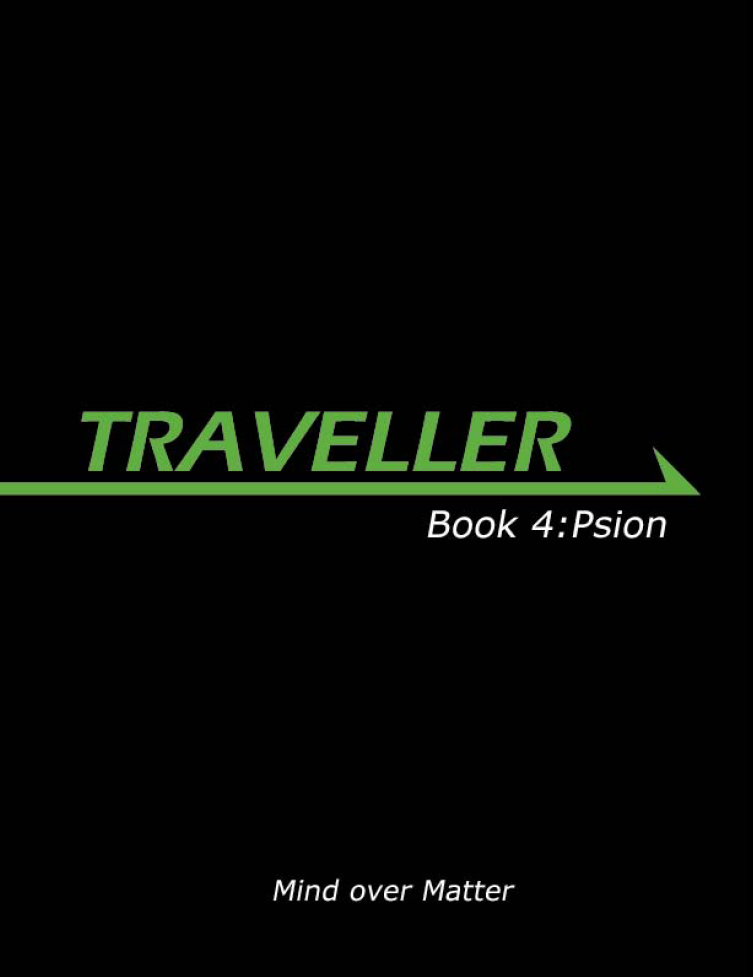Mongoose Traveller Book 4: Psion
This review was originally posted to the pre-magazine Freelance Traveller website in 2009, and has had the publication data corrected and the cover image added for reprinting in the August 2014 issue.
 Book
4: Psion. Lawrence Whittaker
Book
4: Psion. Lawrence Whittaker
Mongoose Publishing http://www.mongoosepublishing.com
96pp, softcover
UKú16.99/US$24.99
Psion, for Mongoose Publishing’s Traveller line, focusses on an aspect of previous versions of Traveller that was given short shrift: the character with “mind powers”.
On the Shelf
As usual, the Traveller logo is prominently displayed in the center of the black cover. Psion is classed as a rules expansion; thus, the Traveller logo is in green. The tag line for this book is the entirely predictable “Mind over Matter”.
Initial Impressions
Psion is consistent with the appearance of other Mongoose Traveller releases, both in basic organization and in production quality. Text and tables are clear and readable, and material is well-organized. The ‘photographic’ artwork is a bit dark, but not obscured.
On Closer Inspection
The short Introduction is followed by four pages defining psionics and six pages describing how to determine what a character’s psionic talents are, what sort of training the character may go through, and what the cost of having those powers might be. These sections are followed by an extensive character generation section, covering thirty-nine possible career tracks in thirteen careers. Many of the careers are ‘psionic’ versions of standard careers, such as scout, agent, drifter, rogue, navy, and so on. Most of these are very similar to their non-psionic counterparts, but the large overlap does ultimately simplify character generation by not requiring nearly constant back-and-forth reference to both this book and the core rules. There are also psion-specific careers, such as the Dedicated Psion Agency (identifying, recruiting, developing, and policing other psions), Temporal Agency (psionic time-travel), and Interdimensional Agency (psionic universe-hopping). In addition to the Basic psionic Talents outlined in the six-page talent section, there are a small number of new Skills, most (but not all) of which are aimed at the psion-specific careers.
A detailed section on psionic powers follows, giving more detail on the Talents, and describing specializations of each (e.g., Life Detection as a specialization of Telepathy, Psionically-Enhanced Strength as a specialization of Awareness, and so on). Each specialization presents information on its capabilities and limitations, and at least one appropriate task entry for using each. This section goes beyond the Basic Talents described in the core rulebook and the beginning of this book, and presents a set of Advanced Talents, such as Machine Symbiosis or Energy Kinesis. These, too, are expanded into specializations with descriptions and tasks.
Following powers, a section on psionic traumas describes some of the disadvantages of having powers, what might cause such traumas, what the effects of psionic trauma cover (including information on playing a traumatized character), and how it may be treated. This includes a four-page list of phobias, two columns on each page, with one-line definitions of each. Given that the book recommends that if a phobia is imposed on a character, it should be related to the psionic activity or the environment that triggered it, inclusion of many of these phobias would seem useless, and your reviewer suspects that there are some that were included simply for humor value or “geek points”.
The Psionic Equipment section contains descriptions of drugs, tools, and weapons that can be used by psions, against psions or their powers, or to duplicate psionic powers for the use of non-psions. Not all powers can be affected or duplicated by the equipment listed.
Separate from the rest of the psionic equipment is the “mind ship”—a ship requiring some level of psionic talent to operate. The various psionics-related components are described, with costs and limitations.
Notable by its absence from this volume is a sample psionic character generated using the rules or careers here; also omitted is what would have been an extremely useful section on missions for psions, providing examples of how a psion could be used in a mission, examples of missions that would absolutely require psionics, and how psions and non-psions might react to each other under various circumstances.
Summary
Although Mongoose Publishing is maintaining their reputation for quality in the Traveller line with this book, it would be hard to say that it stands as high in this reviewer’s estimation as previous numbers in this line, because of the omitted sections. Nevertheless, it cannot be classed as other than a worthwhile acquisition for the referee wishing to include psionics in a campaign.
More than previous rules supplements, Psion shows that Mongoose Publishing views Traveller as a system for role-playing, separate from any settings that they or their customers may already be familiar with. To some extent, this is also indicated by the support for settings other than the Third Imperium (such as Babylon 5, Hammer’s Slammers, and Judge Dredd), but the Traveller fan who bypasses the non-Third Imperium setting books will really first have this driven home with this volume. It is important that such a purchaser recognize this view of Traveller, and not bypass this book in disgust simply because of its inclusion of such ideas as time travel or interdimensional travel.
 Freelance Traveller
Freelance Traveller